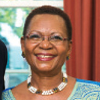Officials
Offical

Oliver Wonekha presented her credentials as Uganda’s ambassador to the United States to President Barack Obama on July 18, 2013. The day had been a long time coming; Wonekha had been named ambassador the previous summer, but government financial problems held up her assuming the post in Washington.
Wonekha, 63, was born and raised in a rural area of Uganda near the Kenyan border. She was the oldest of seven children, the rest of whom were boys. Her parents were teachers, and she initially followed them into the teaching profession. Wonekha earned a Bachelor of Science with honors from Kampala’s Makerere University.
She also worked in the coffee industry for 30 years before entering politics. Wonekha entered Uganda’s parliament in 2001, serving from the Mbale district. She won a seat again in 2006, but this time from the Bududa district. She worked on agricultural issues during her time in the legislature and was named chair of the agricultural committee in her second term. When she left office, she ran for a seat in the East Africa Legislative Assembly, but wasn’t successful.
Wonekha has been quoted as lamenting the gender difference between legislators in her country. Ugandan male legislators are able to network at pubs and clubs after the sessions, while women are still expected “to rush home and make your spouse comfortable.” She also spoke of all legislators being expected by constituents to provide municipal services out of their own pockets.
One of Wonekha’s efforts since coming to Washington has been to help introduce a common East African Tourist Visa, along with Rwanda and Kenya, to encourage travel to those countries.
Wonekha and the Ugandan embassy have been the focus of demonstrations by those protesting Uganda’s draconian anti-gay laws.
Wonekha’s first name—Oliver—has caused some confusion, with some diplomatic directories referring to her as “His Excellency.”
-Steve Straehley
To Learn More:
Obama Receives Wonekha as Ugandan envoy (by Joyce Namutebi, New Vision)
The Berated Politicians: Other Ways of Reading Miriam, Michal, Jezebel and Athaliah in the Old Testament in Relation to Political and Gender Quandary in Sub-Saharan Africa, Kenya and Uganda as Case Studies (by Wabyanga Robert Kuloba) (pages 133-134) (pdf)
- Latest News
- D.C. Public Schools will Teach all Second-Graders to Ride a Bike
- New Rule in Germany Limits Sales of Sex-Themed E-Books to 10pm to 6am
- What Happened to the 6-Year-Old Tibetan Boy the Chinese Government Kidnapped 20 Years Ago?
- U.S. Ambassador to Turkey Photoshops his Hair Color to Mock Turkish Mayor
- Mystery Artist Calls Attention to Unfixed Potholes by Drawing Penises around Them





